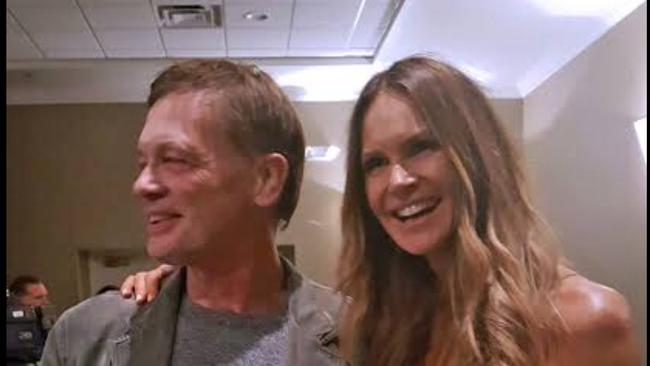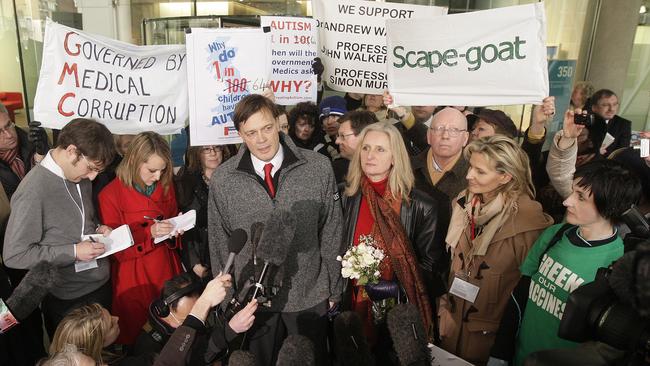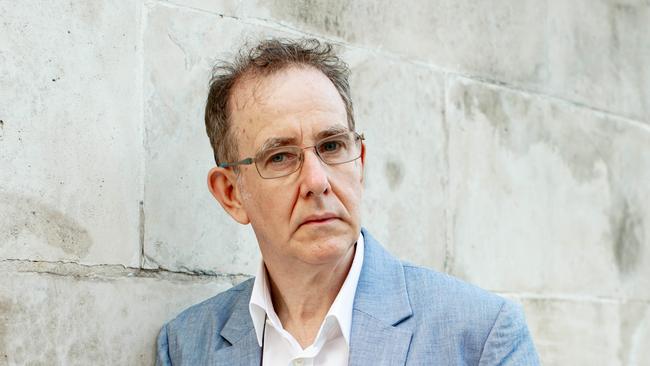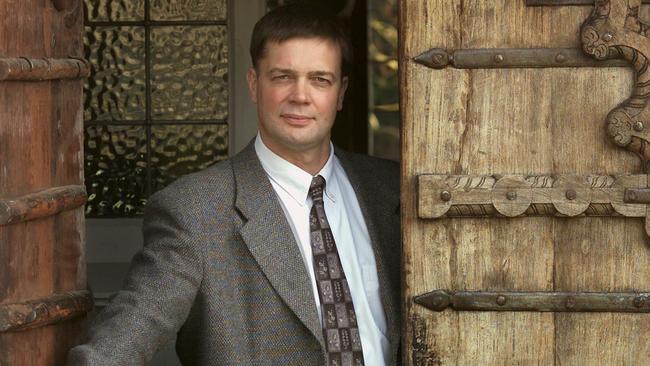Disgraced anti-vaxxer doctor Andrew Wakefield’s new life
He caused global panic when he faked evidence about a common vaccine’s safety. Now Andrew Wakefield is living the high life.

When the coronavirus pandemic struck, I assumed there would at least be one upside. For years, anti-vaxxers had confounded all public-health efforts to persuade them of the wisdom of vaccination. Well, I thought – not any more! Who in their right mind was going to refuse a Covid vaccine, should one emerge? A few of us, it turns out. Nearly five per cent of Australian respondents in April said they would not get the vaccine, while 9.4 per cent were indifferent. In March, seven per cent of Brits expressed serious reservations; by last month that had risen to 16 per cent. In the US, one in three say they would not get vaccinated.
Seldom, therefore, has any new book been more timely than The Doctor Who Fooled the World. As its author says: “To understand where we are now with Covid, you need to know the past – to see how that anti-vaccine movement developed. If we don’t learn from the past, and understand who the anti-vaxxers are and where they’ve come from, then we’re not well placed to evaluate their messages. This is how we got here: through this man and what he did.”
“This man” is Andrew Wakefield, the disgraced British doctor who fabricated evidence, published in respected medical journal The Lancet in 1998, to make a link between the MMR (measles, mumps and rubella) vaccine and autism in young children, triggering a worldwide panic about the safety of vaccination. The book’s author is Brian Deer, the British investigative journalist who exposed Wakefield’s deception in a series of articles in The Sunday Times, beginning in 2004. In 2010, a General Medical Council inquiry concluded the doctor had been dishonest. The Lancet retracted his paper, and in 2011 the British Medical Journal denounced Wakefield for perpetrating an “elaborate fraud”. The truth, and the journalist, had won. Struck off the medical register, Wakefield moved to the US, irredeemably discredited – or so it seemed.

Only, the story did not end there. One of these men is now world famous and rolling in money. A self-styled martyr who claims he was silenced by the British establishment for exposing the “truth”, the 63-year-old Wakefield is feted by conspiracy theorists and anti-vaxxers; he was a guest at Donald Trump’s inauguration ball and has a celebrity girlfriend, supermodel Elle Macpherson. The other man lives alone in south London, and you have probably never even heard of him.
The journalist first smelled a rat over the Lancet paper in which Wakefield, a gut doctor at the Royal Free Hospital in north London, claimed that, by an uncanny coincidence, 12 unrelated sets of parents from all over the country had independently brought their child to see him. According to the paper, parent after parent had told him a chillingly similar story: within 14 days – and in some cases within hours – of receiving the MMR vaccine, their hitherto developmentally normal child was displaying symptoms of severe autism.
What Wakefield had concealed from his colleagues, including co-authors of the paper, was that these parents had been referred to him by a personal-injury lawyer with whom he was secretly working. Wakefield was essentially running a litigation factory at the Royal Free, fabricating evidence for a class-action suit against the MMR vaccine. He was receiving a fortune in funding for his “research” from the lawyer, thanks to the Legal Aid Board. And he stood to profit from his research’s conclusion that separate jabs for measles, mumps and rubella were a safer alternative to the combined MMR, since he was busy patenting his own single-shot measles vaccine.

“When something looks too good to be true,” Deer likes to say, “it probably is.” He slowly revealed Wakefield’s deception through a combination of painstaking investigation and occasional strokes of good luck. For example, the case studies in the Lancet paper had all been anonymised, and had Wakefield not tried to sue Deer for libel in an attempt to halt his investigations, the reporter would never have seen unredacted court papers that identified most of the children. That failed libel lawsuit, Deer grins, was “the biggest mistake of his life”. Once Deer could identify the children, he discovered that Wakefield had falsified medical records and doctored parents’ accounts of symptoms to conceal the fact that some had displayed signs of autism long before receiving the MMR jab.
These inconsistencies and conflicts of interest had escaped the attention of Wakefield’s colleagues, whose own vanities and ambitions were well served by their association with his apparently game- changing breakthrough. At times Deer’s book reads more like a thriller, and reveals the extent to which an ostensibly empirical scientific endeavour can be distorted by the subjectivity of human nature.
Until reading it, I had not understood the role Wakefield’s charisma played in his deception. Those in his orbit, especially women, were often “mesmerised” by him, Deer writes. Among the supportive donors who encouraged Wakefield’s US revival were Chicago lawyer Elizabeth Birt, who raised the money for him to start a new life and sponsored his US visa, wealthy horsewoman Troylyn Ball, and Jane Johnson of the Johnson & Johnson pharmaceutical family; Ball and Johnson set him up in a $280,000-a-year job created just for him. In November 2017, at an anti-vaccine event in Florida, Wakefield was seated with Elle Macpherson in what appears to have been a calculated introduction. “The last I heard of him,” Deer writes, “he was shacked up in Miami, Florida with a supermodel [Macpherson]. Which only goes to show that, once you’ve fooled all of the people some of the time, and some of the people all of the time, your next big idea had better be good.”

But I had always taken for granted that no amount of charisma, ambition and duplicity could get a bogus paper published in The Lancet. Deer allows a hollow chuckle. “That’s the illusion I wanted to tackle,” he says. “That’s what interests me more than all the rest of it.” Is the problem that no system can legislate for an apple as bad as Wakefield, or that the system is fundamentally flawed? “The system is flawed. I’ve never seen Wakefield as having done anything particularly extraordinary against the benchmark of false or dishonest publishing. It’s going on all the time.” In anonymous surveys, Deer points out, when scientists are asked if they have been involved in dishonesty, a small number say yes. “Asked if they know of anyone else involved, you get a huge increase in yes.”
The central flaw, he says, is peer review. “All it means is asking one of your mates to read it through. Peer review is not a test of truth; it’s a test of plausibility. But it’s held up as a magic gold standard. It relieves [publishers] of the expense of checking a thing to see whether it’s actually true.” By implication, is Deer saying that other medical charlatans are getting away with fraud to this day? “Yeah. They are. And those involved in it know this, and have chosen to do nothing about it. You have to remember,” he adds wryly, “that biomedical publishing is a vast and vastly profitable industry.”
Not for the last time during our conversation I’m struck by the parallels between Deer and Wakefield. For Deer, Wakefield’s deception was proof of the systemic flaws of a biomedical establishment that allows some maverick doctors to lie. Wakefield, in turn, spins his disgrace and exile as proof that the system is corrupt – only, of course, in his version he’s the victim, not the perpetrator.
The Covid pandemic makes a vaccine now urgently important. “And we’ve got to re-establish the credibility of the process,” Deer says. He proposes that a condition of publication for any medical paper should be that the author agrees to be interviewed by the editor and an independent expert. “I also believe it should be an offence to knowingly publish false information in a biomedical journal. I’m not talking about being wrong, but being dishonest.” He wants to see an inspection team that can conduct spot checks of labs and their data. “When you think about it, restaurants are subject to inspection. Schools are. Prisons are. But biomedical publishing laboratories? No.”
Wakefield and his supporters have falsely accused Deer of being secretly funded by drug companies, but his early investigative career was distinguished by exposés of Big Pharma malpractice, and when I ask if people are right to be suspicious of the drug industry, he doesn’t hesitate. “Yeah, because it’s like any big business. And that scepticism needs to be addressed. There needs to be an adult conversation about vaccine safety.” He wouldn’t even swear blind that the MMR vaccine cannot, in some rare cases, cause autism. His investigation didn’t prove the vaccine was perfect – just that Wakefield was lying. I ask if he would submit to a Covid vaccine without question. “No. I’d have to look at what they come forward with.”
The idea of Deer as some kind of secret agentfor Big Pharma becomes hilarious within moments of meeting him, for he has all the characteristics of an archetypal investigative journalist. He talks with the borderline obsessive authority of someone who has lived and breathed a story for years; his mind darts from one detail to another so fast it can be hard to keep up.
When I ask what he feels towards Wakefield, he shrugs. “Nothing, really. He’s just one of a number of incorrigible liars that I’ve encountered in my life.” Deer is, however, insightful about the psychology of blame when I ask why so many mothers of autistic children would rather implicate a vaccine than the random caprice of bad luck. “Well, it’s projection, isn’t it? You want to attach blame somewhere. If ‘they’ did it, it wasn’t you. And maybe you’d find some sort of catharsis in suing them. Wakefield is selling them redemption – he lifts from them the burden by placing it on other people. That’s what’s going on.”
Wakefield’s supporters (or “stormtroopers” in Deer’s words) are overwhelmingly mothers. Reading his book, I’d wondered whether Deer, having lost his mother to breast cancer at 14, was particularly sensitive to the spectacle of militant mums fighting for their children. He says no, but concedes he has more sympathy for some mothers than others. “I feel more for the working-class mothers, because people without a substantial education have less opportunity to get things right or understand what’s happening to them.”
Many of these mothers do not feel so forgiving towards Deer. We meet in a south London cafe because he doesn’t want to disclose his home address; when I ask who makes a scarier enemy, Big Pharma or anti-vaxxers, he says at once: “Oh, anti-vaxxers.” He receives “relentless abuse” from them; they once “went to my home to attack it, and defaced the door – but they got the wrong house”. How worried is he? “These people – not all of them, but a segment – have the psychology of the anti-abortion movement. They’re like the new anti-abortionists, and I don’t want to let some crazy person kill me.”
The irony is that, having cost him so much, Deer’s victory was pyrrhic. Since Wakefield was publicly disgraced, his global influence has only ballooned; his anti-vaccine message has spread all over the world, leading to measles outbreaks from Minnesota to Samoa. In the first three months of last year, the World Health Organisation reported more than 110,000 measles cases globally, a 300 per cent rise on the same period in the previous year. Even Donald Trump, before he became president, promoted Wakefield’s MMR theory (though, being Trump, he referred to it as “my theory”).
The greater the consensus among medical experts that Wakefield lied, the more he spins this as proof of the scale of the establishment conspiracy to conceal the “truth”. He has already threatened to sue Deer over the new book – which seems unlikely, given he has twice initiated libel actions yet both times had to withdraw and pay the defendants’ costs. Does Deer worry that by publishing the book he will only add further fuel to Wakefield’s martyr narrative? “My only criteria with any story are: is it new and important? Is it true? Do we have it to ourselves?” He pauses, then adds: “You know, if somebody came to me with persuasive evidence that vaccines were responsible for the dramatic rise in diagnoses of autistic spectrum disorders, I would be proud to publish that.”
In his book he describes the moment when his investigation received the crowning vindication of an extensive write-up in the British Medical Journal, with wall-to-wall coverage across US TV networks. To my surprise, he found himself overcome not by elation but melancholia. “I’m not sure why either, really. Because I suppose it wasn’t what I expected would be my career-defining investigation. I would have wanted it to be something that wasn’t focused on someone who, at the end of the day, is not an interesting person to me.”
Before we part, I ask him about one line in the book that threw me. Why, I ask, did he write that he wished his investigation had proved that MMR really did cause autism? He shoots a surprised look, as if the answer were perfectly obvious. “Well, because it’s a bigger story, isn’t it?”
The Doctor Who Fooled the World: Andrew Wakefield’s War on Vaccines by Brian Deer (Scribe) is out now.

To join the conversation, please log in. Don't have an account? Register
Join the conversation, you are commenting as Logout